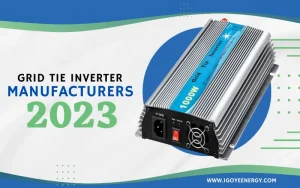Hybrid inverters, integrating the functionalities of both grid-tied and off-grid inverters, have become pivotal in modern energy systems. They offer flexibility, efficiency, and reliability in managing renewable energy sources. This article delves into the reasons behind their necessity and the advantages they bring to both residential and commercial energy systems.
Enhanced Energy Efficiency
One of the primary benefits of a hybrid inverter is its ability to optimize energy efficiency. By intelligently managing the flow of electricity from solar panels, the grid, and battery storage, these inverters ensure that your energy consumption is as efficient as possible. For instance, during peak solar production hours, a hybrid inverter can direct excess energy to battery storage for later use, reducing dependence on the grid and lowering energy costs.
Cost Savings
Hybrid inverters contribute significantly to cost savings in several ways:
- Reduced Electricity Bills: By maximizing the use of solar energy and storing excess power for future use, households and businesses can minimize their reliance on the grid, leading to lower electricity bills.
- Optimized Investment: The initial cost for a hybrid inverter may be higher than traditional inverters, but the long-term savings on energy bills and the ability to avoid peak tariffs make it a wise investment. Hybrid inverters typically offer a quick return on investment, often within 5 to 7 years, depending on energy usage patterns and local electricity rates.
Increased Energy Independence
With a grid tie hybrid inverter, users gain an increased level of energy independence. In the event of a grid outage, the inverter can switch to battery mode, ensuring that critical loads remain powered. This capability is crucial for areas prone to power outages or for those seeking a self-sufficient energy solution.
Flexibility and Scalability
Hybrid inverters offer unparalleled flexibility and scalability in energy management. They can accommodate a range of battery types and capacities, allowing for easy expansion of the energy storage system as needs grow. Furthermore, these inverters can manage multiple energy sources, including solar, wind, and hydro, making them ideal for comprehensive renewable energy systems.

Detailed Specifications and Performance Metrics
When considering a hybrid inverter, it's essential to pay attention to specific metrics and specifications:
- Power Capacity: Hybrid inverters come in various power capacities, typically ranging from 3 kW to 10 kW for residential applications. For commercial setups, capacities can exceed 50 kW.
- Efficiency: The efficiency of hybrid inverters is a critical metric, usually falling between 90% to 98%. Higher efficiency means more of the harvested energy is available for use, reducing wastage.
- Battery Compatibility: These inverters support a wide array of battery technologies, including lead-acid, lithium-ion, and others, providing flexibility in choosing storage solutions.
- Lifespan and Warranty: The average lifespan of a hybrid inverter is about 10 to 15 years, with manufacturers often offering warranties ranging from 5 to 10 years, ensuring reliability and peace of mind.
Conclusion
The necessity of a hybrid inverter in today's energy landscape cannot be overstated. Offering enhanced energy efficiency, significant cost savings, increased independence, and unmatched flexibility, these devices are indispensable for anyone looking to optimize their renewable energy system. With the ability to integrate seamlessly with the grid and manage energy storage effectively, a hybrid inverter is a smart investment towards a sustainable future.